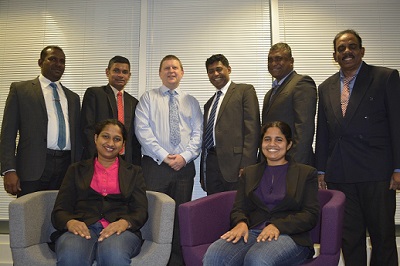Corruption threats are constantly adapting and changing, and we need to maintain vigilance. Accountants and auditors should increase their awareness of these ever-changing risks and better training and education across the profession is key to achieving this.
CIPFA offers a range of professional training courses and materials to boost the fight against fraud and corruption, so when we were approached by WFD to provide forensic investigation training to NAO Sri Lanka, we rose to the challenge.
CIPFA Counter Fraud Training designed a bespoke training programme for the Sri Lanka delegates that comprised:
- A three-day foundation-level training course in forensic investigations delivered at the NAO’s headquarters in Colombo, Sri Lanka to 20 auditors ranging in seniority from superintendents of audit to audit examiners.
- A five-day certified programme: CIPFA’s International Certificate in Financial Crime investigation – following on from the foundation-level training delivered at CIPFA’s headquarters in London to seven individuals selected from the Colombo cohort.
This proposal was welcomed and accepted by WFD and NAO SL and the foundation training took place in November 2018. Attendees received a CIPFA certificate of attendance and 21 hours of continuing professional development (CPD) credit after completing the programme.
The London training, completed in January, was largely practical in nature with a detailed case scenario involving the investigation of a complex procurement fraud at a fictitious public body. Topics included: investigative techniques, different methods of evidence gathering, searching for material and evidence, investigative interviewing, recovering the proceeds of financial crime hidden overseas and concluding with investigative report writing.
Participants were well and truly taken out of their normal audit comfort zone but thoroughly enjoyed the experience, demonstrated by the high scoring feedback we received.
The students have one final piece of work to complete, a marked assignment that involves drafting a full investigations report for the fictitious public body’s audit committee. The report is expected to detail the investigation undertaken through the case scenario, the related practical exercises and provide recommendations for further action.
Successful students will receive CIPFA’s International Certificate in Financial Crime Investigation. The programme was originally devised in 2016 as a module for CIPFA’s Professional Certificate in Public Audit, first delivered to the State Audit Institute of the United Arab Emirates (SAI UAE). SAI UAE continues to support the Certified Audit programme with other SAIs joining them.
However, the financial crime module, while still part of the audit qualification, is now a stand-alone CIPFA certified programme that during the past three years has been delivered to a range of other SAIs and public bodies that retain an investigative remit. It has sparked the beginnings of a consistent set of standards, skills and knowledge across the international public-sector.
It is widely recognised that consistent standards and skills are an important factor in battling international fraud and corruption. Vulnerabilities are created by the way different jurisdictions approach the problem.
Certificate holders can now extend their studies and undergo further training to attain the CIPFA International Diploma in Financial Crime Management. This programme extends students’ knowledge from the investigative to the preventative aspects of fraud and corruption, a feat already achieved by one overseas SAI. The Diploma programme is definitely on NAO SL and WFD’s agendas and CIPFA is looking forward to future collaboration on similar projects with other overseas organisations, to keep up the fight against fraud and corruption internationally.
The next International Certificate in Financial Crime Investigation programme is being hosted on an open-course basis at CIPFA’s HQ in London in May 2019. Contact CIPFA Customer Services on +44 (0)20 7543 5600 or customerservices@cipfa.org.

This article first appeared in The Accountant.